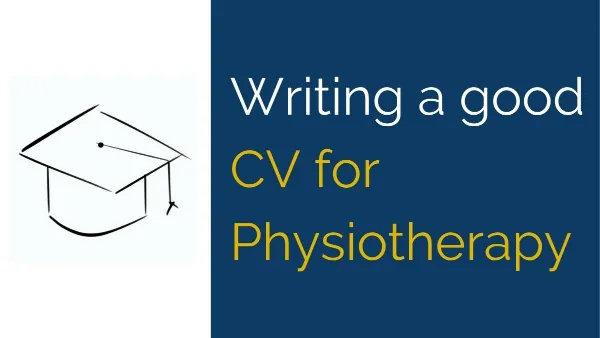Writing a decent CV for Physiotherapy can be a daunting task. You’ve found a job ad that catches your eye – now for the hard bit.
You want to make a good impression, but not list every accomplishment, and convey that you’re a good Physiotherapist, without sounding like you’re all ego.
So here’s a simple, easy-to-apply format for making a great first impression.
What’s the difference between a resume and a CV for Physiotherapy?
It seems like the two terms are used interchangeably, but they’re actually two different formats.
A Curriculum Vitae, or “CV” to its friends, is a longer document which primarily details your academic accomplishments.
Depending on the length of your career and academic study, it’s not uncommon for a CV to exceed 10 pages.
By comparison, a resume is a more concise summary of your career progression.
It tends to focus on more recent work as your recent accomplishments tend to eclipse your early career achievements.
A resume tends to be 1-2 pages in length – almost like a summary of the highlights of your career.
For this post, we’ll group the two types of documents together. Your CV for Physiotherapy should look like a resume anyway, in that it’s concise and shouldn’t be too long (unless you were applying for an academic job at a university).

What are the main parts of a CV for Physiotherapy?
A CV for Physiotherapy needs to detail every aspect of who you are as a Physio, and not so much on who you are as a person if it’s not relevant to your work.
The main sections of a CV for Physiotherapy should include:
- Personal details – name, phone number and suburb are some simple inclusions here. There’s no need to include your date of birth as your career age (years as a Physio) is more important than how many birthdays you’ve had.
- Education – this needs to include your degree/s, university and year of graduation. Also include any special details like honours projects or university medals. You can include your high school if it’s well known and/or prestigious. Don’t include the marks you achieved in individual subjects.
- Registrations and memberships – any prospective employer wants to know if you’re actually registered to start working as a Physiotherapist in the state, so definitely include this info. You can also include any relevant memberships like professional associations and sub-group memberships (eg. sports medicine groups) as it shows your engagement with the industry as a whole. Don’t include unrelated memberships or groups, such as sports associations (eg. Treasurer of local football club).
- Employment – include every part of your employment journey from graduation until now. It tells a story of how you’ve progressed and grown, as well as the exposure you’ve had to different aspects of the profession. Don’t include unrelated employment (eg. soccer referee) unless it has a bearing on your prospective job (eg. as a Physio working with soccer referees).
- Clinical highlights – this is your chance to explain what makes you unique and how you’ve developed over your career. We’ll explain this part in more detail below.
- References – it’s always nice to list your references so the prospective employer can see who will vouch for you. If the job application is something you want to keep quiet (so your current employer doesn’t find out), don’t write “references available if required” as it looks like you’ve got something to hide. Add your references to the document and make a note along the lines of “*Please confirm with me prior to contacting references due to confidentiality of this application”. Your future boss will understand.
What not to include on a CV for Physiotherapy jobs:
- Hobbies – basically no-one cares. If it’s relevant to your job, it should fit into one of the categories above (usually memberships or employment), otherwise it seems like a random unrelated fact that you “love needlepoint and poetry”.
- Non-Physio employment – this one can be tricky. If you worked as a bartender, it doesn’t exactly make you a better Physio. If you worked for a charity, it might make you sound like a better human being. If you really think it supports your application, add it in. But just remember for non-Physio jobs, listing more is not better.
What qualifications are relevant for a Physiotherapist resume?
Listing your basic degree is a no-brainer. The university, course and year of graduation are all critical info in portraying who you are.
After graduation, you’ll potentially another university course (eg. post-graduate masters). That’s also key info, even if it’s not directly related to your prospective job as it shows a hunger for further development beyond your basic course.
Then there are weekend and online courses that you’ll do during your working life. Only list these if they’re relevant to the job you’re applying for.
And that’s it! Don’t list everything as more qualifications doesn’t send the impression you think it might. Lots of non-Physiotherapy and unrelated courses on your CV for Physiotherapy can make it look like you don’t know where your career is heading.
How do I document my interpersonal skills?
Interpersonal skills are a key part of your efficacy as a Physiotherapist, but it’s a hard one to include on a resume.
Simply writing “I’m a great communicator” sounds like a BS line that everyone throws into their CV for Physiotherapy.
You need to include details of how you developed your interpersonal skills in the “Clinical Highlights” section listed above.
If you’d like to show how you’ve developed the ability to communicate with a team of clinicians, include a statement like: “As part of my work at St Jude’s Private Hospital, I was able to develop my team communication skills with regular team conferences on cases”.
If you want to show your thirst for knowledge, you might state: “At Jefferson Physio Clinic, I worked with senior Physios who were amazing mentors and assisted me in developing my skills in complex case management and liaising with coaches”.
Those lines don’t just say I’m awesome at XYZ, it says that I was able to grow my skills effectively with exposure to these situations. It shows skill development and that you know how to acquire the necessary skills to take your career to the next level.
What does an employer look for on a CV for Physiotherapy?
An employer is motivated by success in the eyes of their clients (who pay the bills), so they want what their clients want.
There have been a number of research papers on what patients look for in a therapist, such as this one.
Here are some highlights:
- Patients “considered a practitioner’s qualifications and technical skills important” – use your CV to emphasise how you’ve worked hard to perfect your diagnostic and hands-on skills
- “Just less than a third thought it was important that a practitioner was a good listener” – you can’t/shouldn’t write this in a CV for Physiotherapy but you can show your listening skills by engaging well with your potential employer during your phone calls and job interviews. It’s also a great reason to follow up submission of your CV with a phone call, so they can put a voice and personality to the CV.
- “The practitioner’s reputation had the largest effect on respondents’ preferences and all practitioners with a reputation for technical ability were preferred over those with a reputation for interpersonal skills” – you can note this in your clinical highlights section with points like “I was asked to deliver a workshop series to junior Physiotherapists on diagnostic skills and manual therapy”.
How to make your resume stand out
There are several do’s and don’ts of making a resume/CV for Physiotherapy stand out.
Let’s start with the don’ts:
- WordArt – just don’t. Ever.
- Fancy fonts, headers and graphics – it looks amateur. Minimalist and clean always work.
- Trying to be funny – show your humour during your interview. Don’t try to add a couple of gags to your CV for Physiotherapy.
- Unrelated info – we’ve covered it enough above. It looks like an attempt to make up for a lack of Physio-related info to add to the CV.
And the do’s:
- Simple and concise – less is more. Say your bit and leave out the fluff.
- Clear lay out and sections – make it easy to read.
- Knowledge of the business – you can demonstrate this in your cover letter or your CV but show that you’ve done your research.
- Follow up phone call – don’t harass the employer but try to speak to them so you can make it more personal. Otherwise speak to the practice manager or other staff – they can pass on their thoughts to the boss.

Feel that your career could really take off if you found a better job?
Looking to expand your skills (and income) with a 2nd job? Or maybe some weekend work or sports coverage?
We offer a free service, anonymously matching awesome Physios with awesome jobs (your identity is always protected). The next great opportunity of your career might be searching for you right now.

